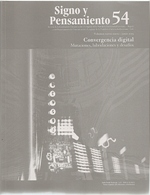Abstract
Book review: Rueda Ortiz, R. y Quintana Ramírez, A. (2007). Ellos vienen con el chip incorporado: aproximación a la cultura informática escolar. Prólogo de Octavio Henao Álvarez. Bogotá: Alcaldía Mayor de Bogotá, Instituto para la Investigación Educativa y el Desarrollo Pedagógico (IDEP), Universidad Distrital Francisco José de Caldas, Fundación Universidad Central, Instituto de Estudios Sociales Contemporáneos (IESCO). 2º edición. ISBN 978-958-8247-98-4.
During the last years we have heard within the educational institutions the debate about the possibilities and the challenges that the technology presents to all the actors of the educational system. To corroborate this, it suffices to inquire about the number of initiatives that are presented both in the public and private sectors or with a review of the research groups whose purpose is to study the relationship between the educational field and technology. In this line, the work of Rueda y Quintanilla problematizes around the technologies in the educational task, carefully examining the changes, effects and impact they have on the school culture; likewise, it analyzes the fears that grow around the way in which they have been venturing into the educational environment for several decades.
This journal is registered under a Creative Commons Attribution 4.0 International Public License. Thus, this work may be reproduced, distributed, and publicly shared in digital format, as long as the names of the authors and Pontificia Universidad Javeriana are acknowledged. Others are allowed to quote, adapt, transform, auto-archive, republish, and create based on this material, for any purpose (even commercial ones), provided the authorship is duly acknowledged, a link to the original work is provided, and it is specified if changes have been made. Pontificia Universidad Javeriana does not hold the rights of published works and the authors are solely responsible for the contents of their works; they keep the moral, intellectual, privacy, and publicity rights.
Approving the intervention of the work (review, copy-editing, translation, layout) and the following outreach, are granted through an use license and not through an assignment of rights. This means the journal and Pontificia Universidad Javeriana cannot be held responsible for any ethical malpractice by the authors. As a consequence of the protection granted by the use license, the journal is not required to publish recantations or modify information already published, unless the errata stems from the editorial management process. Publishing contents in this journal does not generate royalties for contributors.


